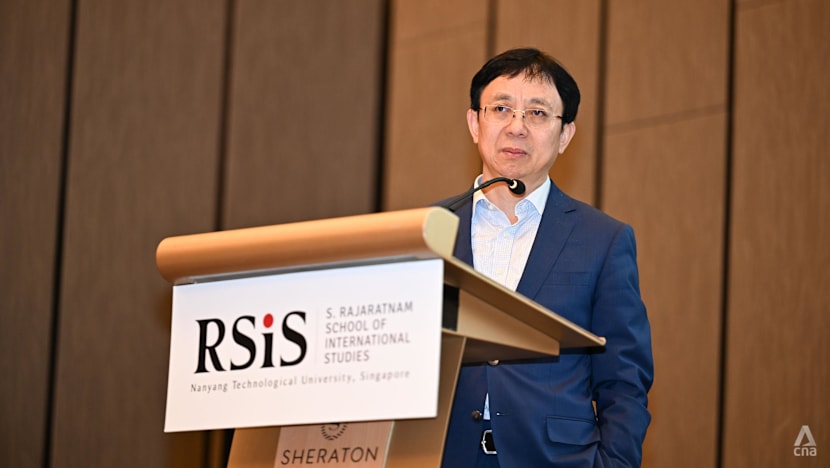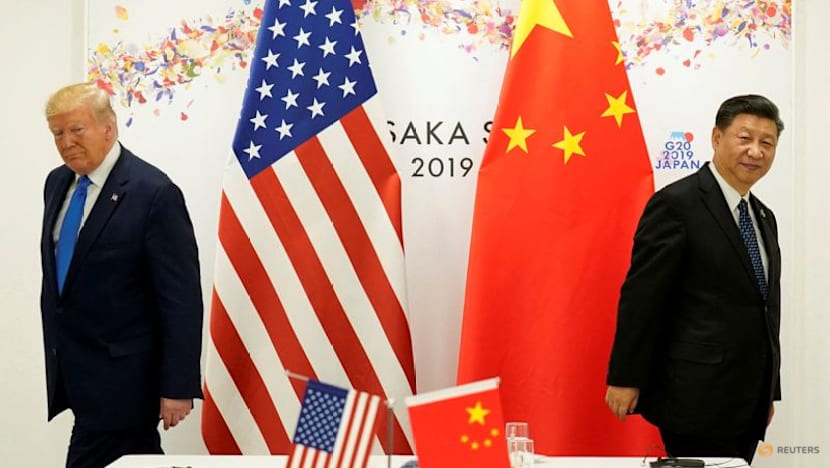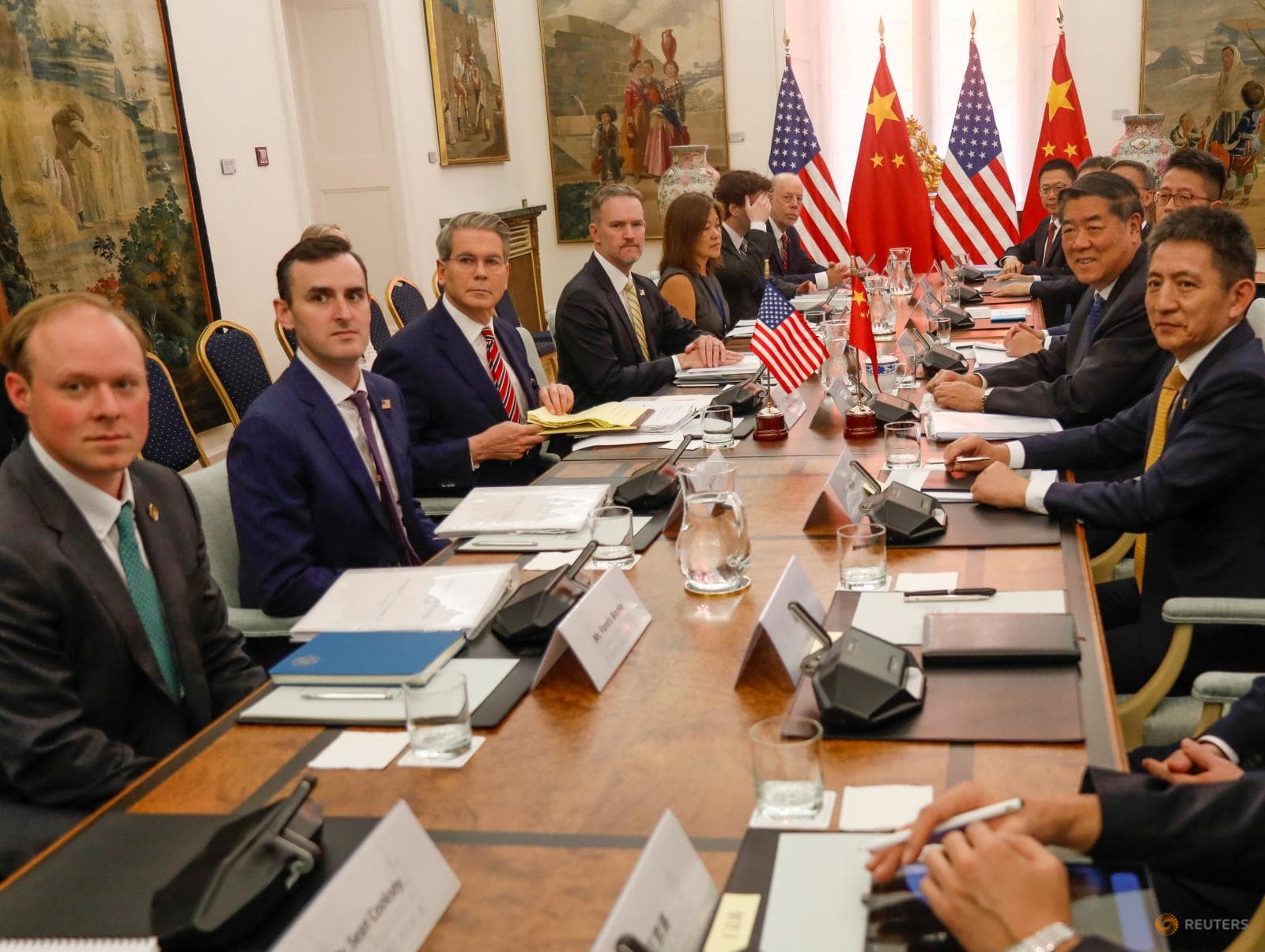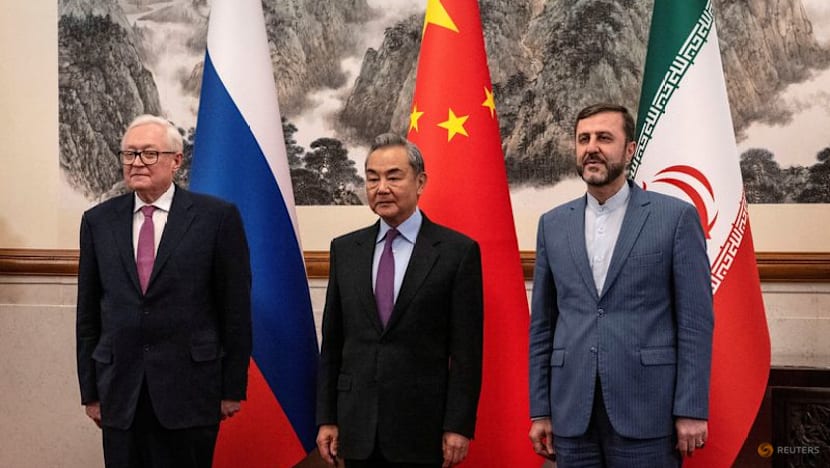analysis East Asia
As talk of a US-China ‘grand bargain’ intensifies, what would such a deal entail?
Any such deal would require the United States to “reconform” to its one-China policy and to also stop “containing and suppressing” Beijing, says eminent Chinese scholar Wu Xinbo.

Eminent Chinese scholar Wu Xinbo, a professor at Fudan University, speaks at the S Rajaratnam School of International Studies (RSIS) Distinguished Public Lecture at Sheraton Towers, in Singapore, Oct 9, 2025. (Photo: CNA/Tan Wen Lin)

This audio is generated by an AI tool.
SINGAPORE: A potential third “grand bargain” between the United States and China will require Washington to reconform to its one-China policy and “stop containing and suppressing” Beijing in the name of strategic competition, says an eminent Chinese scholar.
If the US were to make such moves, Beijing would reciprocate both economically and on the security front, and possibly even take an “easier” attitude towards the issue of Taiwan, according to Wu Xinbo, dean of the Institute of International Studies and director at the Centre for American Studies at Fudan University.
Wu made the remarks on Thursday (Oct 9) in Singapore while delivering a lecture on the evolution of the Asia-Pacific regional security landscape. It was organised by the S Rajaratnam School of International Studies (RSIS).
“If in the next 10 years, 20 years, China and the US can strike a grand bargain, as they did in the past, that will lead to a … future with the interplay among multiple actors with a blend of behaviour such as cooperation, hedging and competition,” he said, in his 30-minute lecture.
It was followed by a 50-minute dialogue session during which the topic of a Sino-US grand bargain dominated discussions as fellow academics and journalists pressed him on how such a deal might realistically take shape.
Globally, talk of a US-China grand bargain - where both sides make reciprocal concessions to reset their fraught bilateral relationship - has intensified in recent months as an uneasy trade truce endures between the world’s two largest economies.
It also comes as a potential in-person meeting between Chinese President Xi Jinping and US President Donald Trump looms later this month at the Asia-Pacific Economic Cooperation (APEC) summit in South Korea, although significant scepticism remains over whether such a sweeping deal is achievable.

A THIRD US-CHINA GRAND BARGAIN?
In his lecture, Wu warned that a serious clash between China and the US would result in a divided and confrontational regional landscape regardless of which side prevailed.
“The result is almost the same; a return to the Cold War structure,” said Wu, addressing an audience that included fellow academics and members of the media.
In contrast, Wu said a new grand bargain could sustain a more secure future where regional actors, major and minor, may still play important roles through a mix of cooperation, hedging and competition.
He suggested that Beijing and Washington had struck similar agreements in the 1970s and early 1990s.
In 1972, then-US President Richard Nixon’s landmark trip to China yielded the Shanghai Communique, which saw Washington acknowledge the one-China policy and both sides commit to advancing diplomatic, economic and cultural exchanges.
In the 1990s, after the Cold War, the US backed China’s entry into the World Trade Organization and wider global economy, while Beijing expanded its participation in international bodies and treaties.
“So if you compare these two scenarios, which one is good for regional security? Obviously, the second scenario, and the question of course, will be, can China and the US strike a grand bargain down the road?” said Wu, referring to the contrasting scenarios of continued conflict and of another “grand bargain”.
Wu then ended his lecture by asking the audience whether the two sides might again find a chance to secure another in today’s fraught geopolitical climate.
The topic of a possible US-China grand bargain dominated the subsequent Q&A session, with Wu pressed on the likelihood of it coming to pass and the necessary conditions to make it happen.
Wu suggested that Washington would need to do two things.
“The US should stop containing and suppressing China in the name of strategic competition, and two, reconform to the one-China policy, as it did in the past,” he said.
If done, Wu said China would reciprocate economically as well as in security.
On the economic front, actions taken by Beijing would include continued support for the US dollar and keeping up the purchase of US federal bonds, Wu said, alongside other moves such as exporting rare earths and magnets to Washington.

On security, China may take an “easier” attitude towards the Taiwan issue, because if the US reaffirms its one-China policy, it will help reduce Beijing’s concerns over the issue of Taiwan independence, Wu said.
China views Taiwan as its territory and has stepped up military and political pressure over the past few years. It has repeatedly warned that it views any support for Taiwan independence as a red line.
“I think it’s kind of similar to what we see in the past. The only difference is that this time, China can deliver more economic goods to the US because of China's rising economic and financial power,” Wu said.
HOW WOULD US ALLIES REACT?
When questioned on how US allies might react to a US-China grand bargain, Wu was of the view that they would welcome it.
On one hand, it sends out a message that the US under Trump is trying to reduce its military presence and security commitment to the region while urging its allies to spend more on their militaries, he said.
“This has been resisted by South Korea, Japan and Australia. Because they have to make their own decisions about what positive GDP (gross domestic product) they should spend on the military, they don't just want to follow Trump's numerical instructions,” he said.
Under Trump, the US has been pressing its allies to increase defence budgets, often criticising them for relying too heavily on America’s security umbrella.
On the other hand, Wu believes a successful Sino-US grand bargain will create more conducive conditions for America’s allies to engage economically with China.
He pointed out that in the case of Japan, South Korea and Australia, China is already their top trading partner.
The regional landscape in the wake of a grand bargain may essentially be similar to how it was after the Cold War, when most countries reduced their military spending and concentrated more on economic growth, Wu suggested.
"Most of the US allies would welcome a grand bargain between China and the US … (they) may worry more about Trump’s “inward-looking” strategic posture rather than a Sino-US grand bargain,” he said.
Wu was also asked if there was a scenario where China would possibly lean towards forging alliances rather than sticking to its traditional partnership model, particularly in the context of security.
Amid mounting “strategic pressure” by Washington, there has actually been debate in China on whether this policy should be adjusted, whether it should ally with Russia or Iran or some other countries in this region,” Wu shared.

Wu believes it is “very unlikely” that Beijing will formally abandon its current partnership-centric policy.
“However, you will see more substantive security cooperation between China and some partners, including Russia, including Pakistan, including some countries in this region,” he said.
Not having “abiding treaties of alliance” allows for more substantive cooperation, leaving more flexibility for both sides, he added.
ASEAN’S REGIONAL ROLE
Wu was also asked about his thoughts on the role of the Association of Southeast Asian Nations (ASEAN) in the regional security landscape moving forward.
Some institutions launched by ASEAN in the past two or three decades have “not been that successful”, including the ASEAN Regional Forum and other regional security initiatives, Wu said.
At the same time, Wu highlighted the “obvious” value of the regional bloc, pointing out how in the post-Cold War era, it gathered all the “relevant actors” within and beyond the region to discuss security issues.
“Particularly … China’s security interactions with Asian countries in terms of joint military training, joint military exercises,” Wu said.
In the 1990s, when the ASEAN Regional Forum was launched as a platform for regional security dialogue, China was invited to participate.
Wu said this was “quite a challenge from the very beginning” for Beijing as it had to effectively learn how to conduct security cooperation with other countries after long relying on itself for its own security
If not for ASEAN, it’s unlikely military engagement between China and the region would be at current levels, said Wu.
“So the institutions may not be that successful, but the process - to some extent, the security culture that has spread in this region (is) still very much relevant to today's security landscape,” he said.
“Without which … the situation may be even worse.”





















